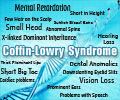Diagnosis of Intellectual disability
Intellectual disability is diagnosed based on standardized tests.
Intellectual disability or is a diagnosis is based on three areas of development and functioning.
- The onset of disability must be before 18 years of age.
- General intellectual functioning at below average level, based on the intelligent score obtained by assessment with one or more standardized, individually administered intelligence tests. The testing instrument and the results interpreted must be based on other intervening factors that include sociocultural background, language and communication, motor and sensory disabilities.
- Impaired or limited adaptive functioning in one or more areas like communication skills, independent living, and social participation.
The American Association on Intellectual and Developmental Disabilities (AAIDD) and the American Psychiatric Association (APA) have enumerated diagnostic criteria based on which the diagnosis of intellectual disability can be made.
Based on the performance on the standardized testing and the other two criteria, the severity of intellectual disability is diagnosed. Some standardized tests measure intelligence across the domains of conceptual, social and practical skills.
Diagnosis of intellectual disability is very important for the treatment plan, management and also the future life plan of the individual.











